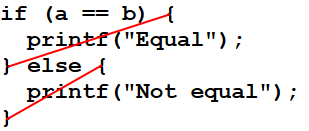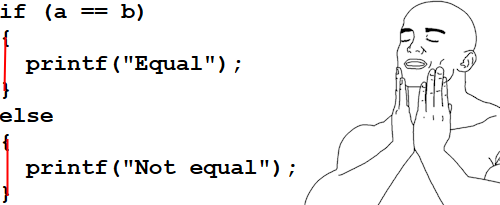
This page exists, so I don't have to explain the arguments of why I prefer the clean code style over other standards.
I focus here mainly on the biggest differences between clean code style and other widely popular standards
This rule is the cornerstone of all of the arguments here.
It is well estabilished fact, that code is typically read many more times compared to it being written.
The process of writing, fixing and refactoring code should mainly consist of reading existing code, making a
mental image of what is the code like, and then making the changes we need.
This means, that code style should be optimised for reading clarity long before other things.
The Egyptian Style Brackets owe their name to hieroglyphs as the resemblance between the code and the image shows.

The motivation is to save space and make the code more compact, but it hurts readability:


if (a == b)
{
printf("Equal");
}
else
{
printf("Not equal");
}if (a == b)
printf("Equal");
else
printf("Not equal");The biggest counter argument to this is that someone could add another command to the one-command block and break the code without realizing. It practically never happens, as it is clear at the first sight that something is wrong, but even in the very rare cases someone would do that by mistake modern compilers and code checkers can recognize this situation:
void foo()
{
if (a == b)
printf("Equal");
else
printf("Not equal");
foo(); // Compiler warning gets triggered
}